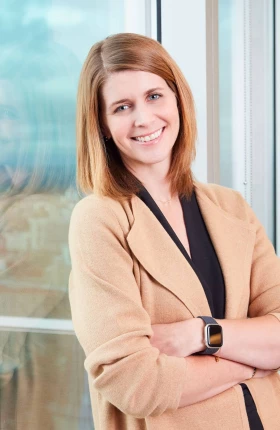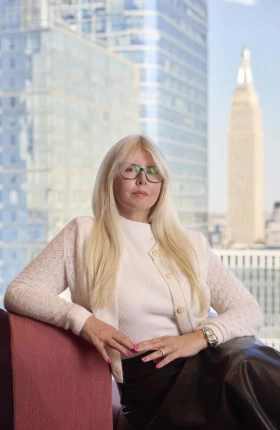When she reflects on her career path, Sandrine Piret-Gérard sometimes finds herself wondering: Did she find health care, or did health care find her?
Sandrine (Brussels, 1999–2003) joined the Boston Consulting Group directly upon graduating from college. At the time, she didn’t know exactly what she wanted to do, but she says that BCG gave her the chance early in her career to work across different industries and to get a feel for what she liked and didn’t like. It was while working on a health-care project that she realized she’d found an industry in which she felt “very much at home.”
Perhaps her affinity for health care shouldn’t have been such a big surprise: her grandparents, parents, and siblings had already carved out careers—from doctors, to specialty nurses, to midwives—in health-care service. “I guess I was subconsciously drawn in that direction,” Sandrine says. “I knew I wanted to be part of an industry where I could make a significant difference. I am driven by the idea of helping people live better lives.”
Today, Sandrine is country head, Germany, of pharma company Sandoz (part of the Novartis Group). With more than 400 products—in a portfolio that includes over-the-counter items, classic generic drugs, and biosimilars—Germany is Sandoz’s second biggest market.
Two-thirds of the German population uses at least one Sandoz product each year, to the tune of 200 million packs per year. “Sandoz has a massive presence and is an indisputable partner for the patient,” Sandrine says.
Sandrine is in charge of “everything in Germany,” from product development, to production, to commercialization. Although today she is responsible for approximately 3,000 employees, when she first joined Novartis, she says, she was prepared to take some small steps backward in preparation for many bigger leaps forward. She started as a sales rep; she worked as a junior product manager; and she took on a number of other tasks that, for an ex-BCGer with a newly minted MBA in hand, “might not have been deemed very sexy.”
“I wanted to build understanding and credibility by exploring basic roles within the organization,” Sandrine says. “As such, having already done many of these jobs, I now know exactly what I’m looking for when I recruit to my team.”
She describes her leadership style in terms of that of an orchestra conductor. “I don’t have to be a virtuoso on every instrument. Knowing how each is supposed to sound, I can dare to recruit people who are better individual players than me. I just have to make sure that the music sounds good.”
Beyond her responsibility to ensure that all patients across Germany have access to Sandoz products, Sandrine works to bring new drugs to market, particularly in the biological space. Biological drugs are the biggest cost driver in the pharmaceutical world. Eight of the top ten selling drugs in the world are biologicals, and they are very expensive. However, all the big biological drug manufacturers will see their patents expire in the coming years, which poses a challenge to those companies.
Sandoz plans to strengthen its presence with biosimilars.
A biosimilar is a biological product that is highly comparable to an existing biological drug, known as the reference product. In terms of safety and effectiveness, there are no clinically meaningful differences between a reference product and a biosimilar.
“It’s extremely difficult to develop a biosimilar,” Sandrine says. “A biological drug is a living organism. We need to develop living organisms that are as similar as possible to the original. While very few companies can do this, I believe it will be critical to keeping health-care systems sustainable over the long run.”
At the same time, the biopharma industry is experiencing disruption and competition from some unlikely players. Technology company Samsung, for instance, in partnership with a Biogen, a traditional biotechnology company, launched two biosimilar drugs in Germany in 2016. “Samsung came in and used its financial resources. It used its technology expertise. It found new ways to recruit patients for clinical trials. Think about this,” Sandrine says. “An electronics giant is now in the biopharma business. And they’re not the only ones: Google X is bringing its data-mining capabilities to the sector.”
In terms of digital transformation, she adds, the pharma industry is among the least developed compared to other industries. Meanwhile, as the global population greys and grows, health-care system costs are exploding, and burdens on the system have become unsustainable. “It’s a burning platform…and we need to move. We must find ways to partner with disruptive, nontraditional players. We need to change as an industry if we are to survive.”
Sandrine, who was named one of the Top 40 Under 40 by German newspaper Bild, credits her readiness to tackle these problems, as well as her rise through the ranks at Novartis, in part, to her time at BCG. “I would never have had the career I’ve had without the BCG stamp on my skin.”
“As a BCGer, you’re assigned to projects where you might not initially know much about a given client’s industry. It’s all new, and you have to get to know the business in-depth and quickly by asking the right questions and finding parallels with other industries. I call it learning agility.
She adds, “BCG teaches you to structure your thinking analytically, to distill your analysis and present it clearly on a few short slides. Believe me, that’s not something everybody is capable of doing.”
Magically, she says, that combination of learning agility and structural analytical thinking helped develop one other invaluable tool—confidence.
SANDRINE’S ADVICE TO YOUNGER WOMEN IN BUSINESS
“What I often see in younger women in the business world is a lack of confidence—they’re afraid to demand too much, and they’re not sure they can succeed. I would love to see them have more belief in themselves and what they can achieve.
“My advice? Don’t be afraid, be proud of who you are, sell yourself, and be more confident.
“But it takes a lot of work. Don’t think that somebody is going to magically offer you everything on a platter. If you don’t make your ambitions known, if you don’t let yourself be heard and ask for what you need, then it is not going to happen.”




